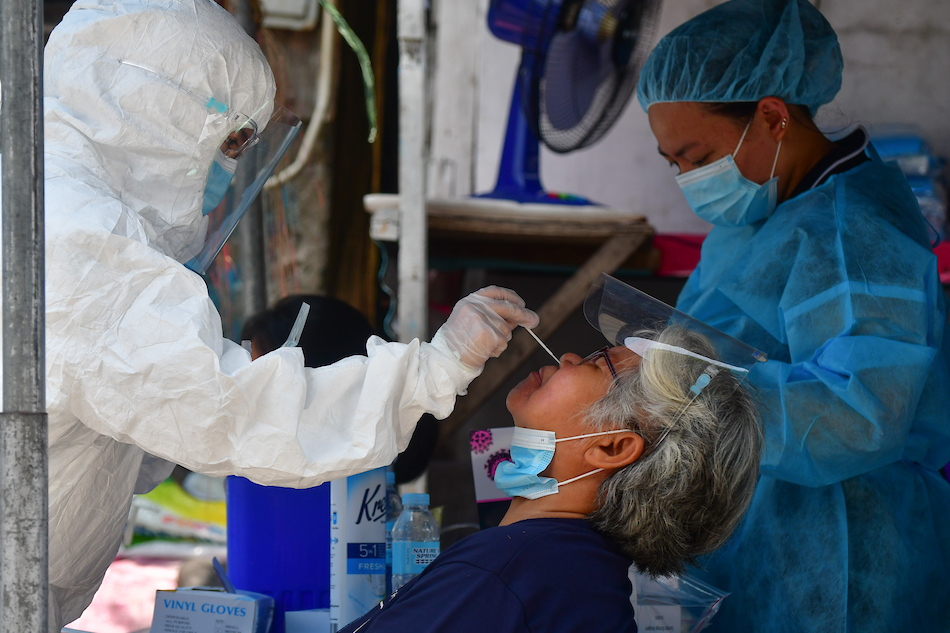Priority for elderly, healthworkers sought in COVID-19 testing: DOH | ABS-CBN

Welcome, Kapamilya! We use cookies to improve your browsing experience. Continuing to use this site means you agree to our use of cookies. Tell me more!
Priority for elderly, healthworkers sought in COVID-19 testing: DOH
Priority for elderly, healthworkers sought in COVID-19 testing: DOH
Gillan Ropero,
ABS-CBN News
Published Jan 14, 2022 02:31 PM PHT
|
Updated Jan 14, 2022 02:58 PM PHT
MANILA -- The Department of Health (DOH) has recommended to prioritize health workers, the elderly, and persons with comorbidities for COVID-19 testing, its spokesperson said Friday as infections are expected to rise until the second week of February.
MANILA -- The Department of Health (DOH) has recommended to prioritize health workers, the elderly, and persons with comorbidities for COVID-19 testing, its spokesperson said Friday as infections are expected to rise until the second week of February.
It is important to conduct confirmatory tests on these vulnerable sectors (A1 to A3) to give them proper medicines as early as possible, according to Health Undersecretary Maria Rosario Vergeire.
It is important to conduct confirmatory tests on these vulnerable sectors (A1 to A3) to give them proper medicines as early as possible, according to Health Undersecretary Maria Rosario Vergeire.
"Para sa A1 to A3... ang ating testing ay inirerekomenda na i-prioritize sa mga sitwayson na ang testing ay makakaapekto sa ibibigay na medical management," she said during a virtual public briefing.
"Para sa A1 to A3... ang ating testing ay inirerekomenda na i-prioritize sa mga sitwayson na ang testing ay makakaapekto sa ibibigay na medical management," she said during a virtual public briefing.
(For A1 to A3, testing is recommended to be prioritized in situations where it can affect medical management.)
(For A1 to A3, testing is recommended to be prioritized in situations where it can affect medical management.)
ADVERTISEMENT
Individuals with symptoms but have yet to be tested are now called "COVID probable," Vergeire said.
Individuals with symptoms but have yet to be tested are now called "COVID probable," Vergeire said.
"Management both for those with symptoms na nakapag-test o walang test ay pareho lamang po (who have been tested or have not been tested is the same), we will isolate or quarantine them if they had been exposed," she said.
"Management both for those with symptoms na nakapag-test o walang test ay pareho lamang po (who have been tested or have not been tested is the same), we will isolate or quarantine them if they had been exposed," she said.
Persons exposed to symptomatic individuals who have yet to be tested are urged to isolate and look out for symptoms within 14 days, Vergeire added.
Persons exposed to symptomatic individuals who have yet to be tested are urged to isolate and look out for symptoms within 14 days, Vergeire added.
The country's virus cases are expected to rise until end of the month at the earliest or until the second week of February at the latest, according to the spokesperson.
The country's virus cases are expected to rise until end of the month at the earliest or until the second week of February at the latest, according to the spokesperson.
"Base sa projections... ang peak ng mga kaso (the peak of virus cases), it’s not going to happen soon... towards end of January or even as late as second week of February," she said.
"Base sa projections... ang peak ng mga kaso (the peak of virus cases), it’s not going to happen soon... towards end of January or even as late as second week of February," she said.
Government cannot prevent the spread of the coronavirus but it can prepare by allocating more ward beds and intensive care unit beds, Vergeire added.
Government cannot prevent the spread of the coronavirus but it can prepare by allocating more ward beds and intensive care unit beds, Vergeire added.
Read More:
DOH
Department of Health
COVID-19
omicron variant
COVID-19 testing
Philippines COVID-19
coronavirus
A1
A2
A3
ADVERTISEMENT
ADVERTISEMENT


